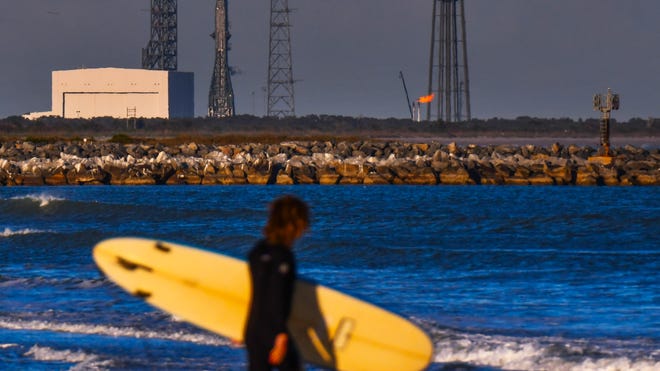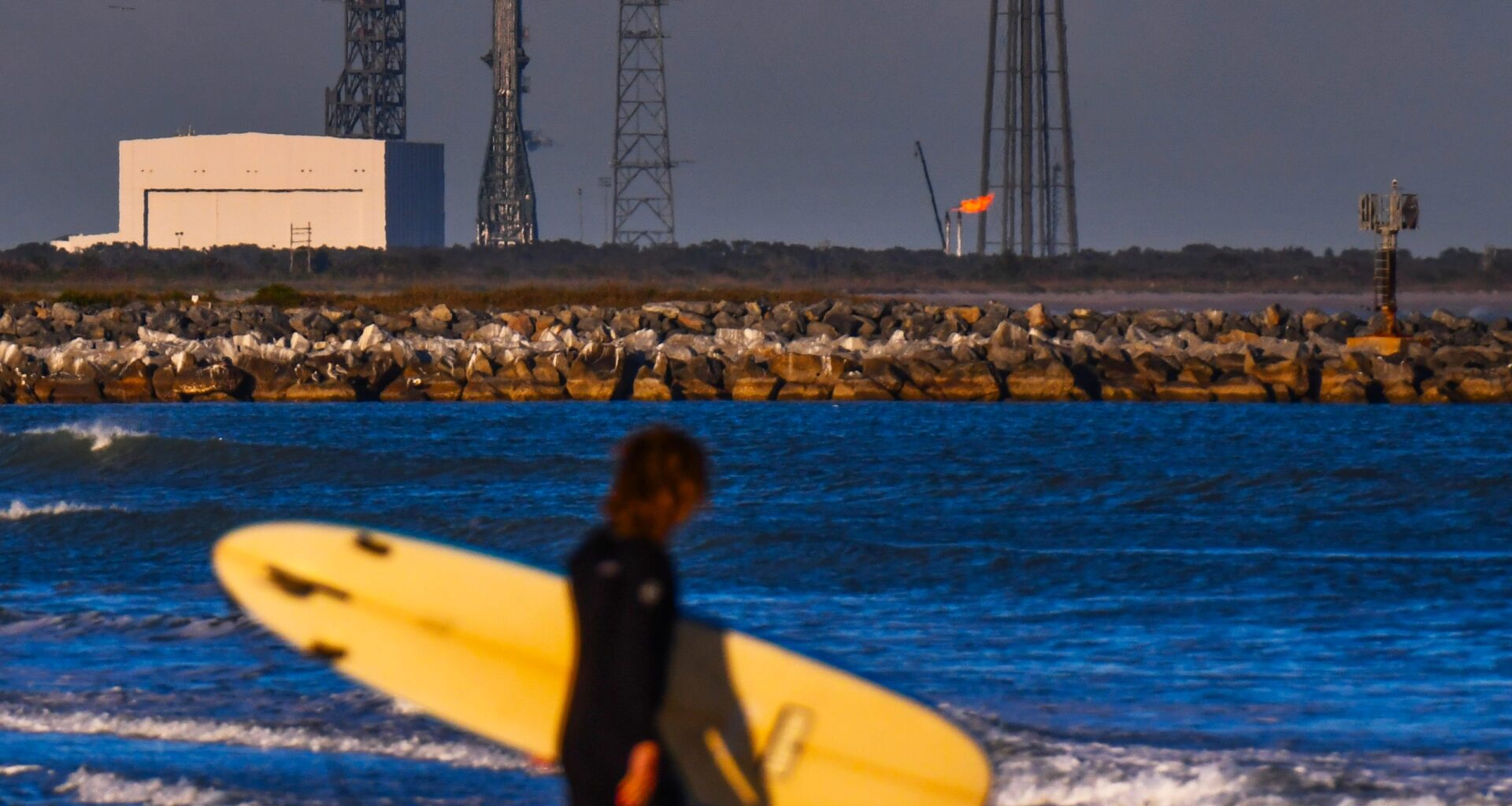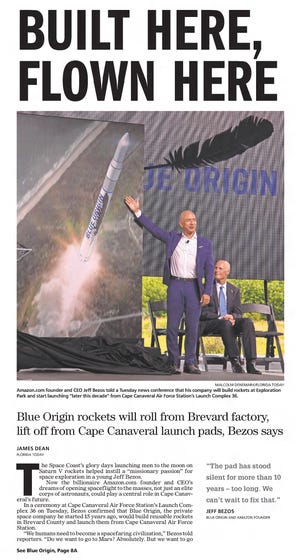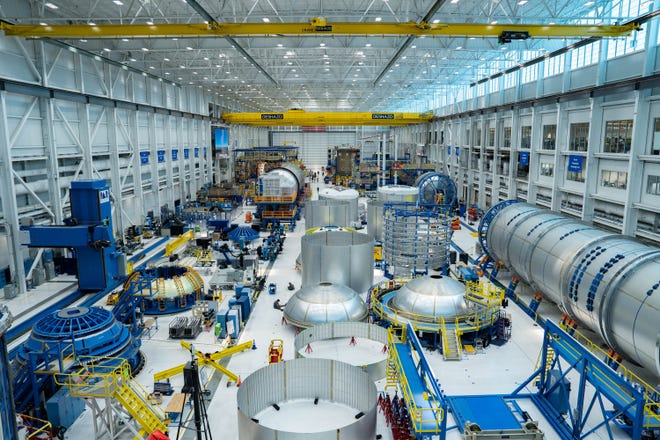
Amazon mogul Jeff Bezos founded Blue Origin back in September 2000, months after the Y2K scare. Now, nearly a quarter-century later — and years after competitor SpaceX grew to dominate the world’s commercial space industry — Bezos’ company is finally on the brink of launching a rocket from Florida’s Space Coast.
Blue Origin appears close to announcing a launch date for its historic New Glenn maiden flight from Cape Canaveral Space Force Station. Built at a futuristic Merritt Island factory, the heavy-lift rocket looms more than 320 feet tall; the first-stage booster will target landing atop a drone ship; and the boosters are engineered to power at least 25 missions.
“It’s an exciting time. There’s no doubt about that. This is really quite a development, and they’ve really planned this very carefully over the past at least six, seven years leading up to this point, said Sean O’Keefe, who served as NASA administrator from December 2001 to February 2005.
“This is the closest rival to a Saturn V seen in 50 years. It’s an incredible piece of machinery. So it’ll be interesting to see how this goes out,” O’Keefe said.
Rocket photography:Blue Origin’s New Glenn poised to compete with SpaceX, disrupt heavy-lift rocket market
No launch date has been set by Blue Origin but the Federal Aviation Administration shows a window from 1 a.m. to 4:45 a.m. Wednesday.
Oceanfront spectators at Jetty Park and Cocoa Beach have monitored the rocket’s pre-liftoff activities at Launch Complex 36 on the horizon in recent weeks, including a Dec. 27 hot-fire test of the first stage’s seven BE-4 engines.
After liftoff, the New Glenn first-stage booster will target landing aboard Blue Origin’s drone ship Jacklyn, which was named for Bezos’ mother, hundreds of miles out in the Atlantic Ocean. Thursday afternoon, various space websites and observers noted that Jacklyn was departing Port Canaveral, sparking speculative buzz.
O’Keefe credited SpaceX’s rise as the industry market leader, and for rapidly developing its space exploration capabilities by operating in a mode of, “we’re going to learn from whatever the results are in order to build that in.”
Conversely, he said timing was not Blue Origin’s factor of consideration in sending New Glenn on its maiden flight. He said the company also kept close hold on promulgating its primary objectives during years of preparation.
“This is a sharp contrast to other commercial space launch variants that have been heavily publicized and hyped and everything else. Blue Origin has really kept to their tending on this one to make sure that they’ve got everything sorted out, and have done it in a way — it’s been not below the radar, but certainly not dominant on the radar — like their arch-competitor has been doing for quite a while here,” O’Keefe said.
“So it’s an interesting approach to it, and it’s a reflection to the company itself. It’s a very serious-minded group that has been planning this for some time. They want to do it right. And they’re really putting a lot of effort into making sure that all the issues are covered before they launch,” he said.
Space industry evolving like commercial aviation
Blue Origin officials plan to launch dozens of New Glenns in the coming years to carry payloads for NASA, Amazon’s Project Kuiper, AST SpaceMobile, telecommunications providers and U.S. governmental customers like the Space Force.
Speaking of New Glenn’s maiden launch, O’Keefe draws parallels between the nascent commercial space industry with the development of the commercial aviation business during the past century.
“The idea of developing aviation capabilities was accessing remote parts of the globe for cargo delivery, for delivering the mail, for agricultural purposes, for mapping the terrain. All the different things that got the commercial aviation business off the ground literally were engineered and proffered as a result of the opportunity of public programs that blazed that trail to develop that kind of a capability,” O’Keefe said.
“What we’re seeing is a pattern that is precisely the same. The big difference is, it’s being achieved sooner. And that’s just a function of how the technology has developed so drastically in the past 75 to 100 years to make it feasible to build capabilities on the prior success of everything that has been done before,” he said.
Today, O’Keefe is the 17th person in Syracuse University history to hold the title of University Professor, the institution’s highest faculty rank. A former chairman and CEO of Airbus Group, he is also a senior adviser at the Center for Strategic & International Studies in Washington, D.C.
O’Keefe noted that the early days of aviation appealed to the rich and famous, who were “taking flights that were short hops and paying a lot for it.” Blue Origin has done similarly by flying “space tourists” since July 2021 — including Bezos and “Star Trek” actor William Shatner — aboard its far-smaller, suborbital New Shepard reusable rockets from the West Texas desert.
Blue Origin’s Merritt Island factory is ‘unbelievable’
Bezos occasionally discusses his long-term vision of millions of people living and working in space. During a New York Times DealBook Summit interview last month, he talked about moving all polluting industry off Earth so the planet could be zoned for residential and light industrial uses.
To that end, Blue Origin has invested more than $3 billion in facilities in Florida and employs more than 3,000 workers in the state, Megan Mitchell, Blue Origin’s vice president of government relations, told FLORIDA TODAY in October. Construction crews continue building structures at the enormous New Glenn rocket factory at Exploration Park on Merritt Island.
“The complex is unbelievable. I mean, this is one of the biggest construction infrastructure efforts at the Cape since the 1960s,” O’Keefe said.
“It is really an impressive-looking facility in that sense. And by all indicators, all the information that they’ve put out — which is limited — nonetheless speaks to the fact that they intend to do this very meticulously and do it the right way,” he said.
“This is much more in the range of the kind of objectives that Bezos has articulated — very sparingly — over establishing a capability to leave low-Earth orbit and operate a vehicle that is capable of potentially going to the moon, beyond, etc.,” he said.
“And that’s a real testimonial to the discipline that this company has put into this, which is more about, ‘Let’s measure the success, rather than measure the enthusiasm of what it’s going to take to get there,’ ” he said.
For the latest news from Cape Canaveral Space Force Station and NASA’s Kennedy Space Center, visit floridatoday.com/space.
Rick Neale is a Space Reporter at FLORIDA TODAY. Contact Neale atRneale@floridatoday.com. Twitter/X: @RickNeale1



